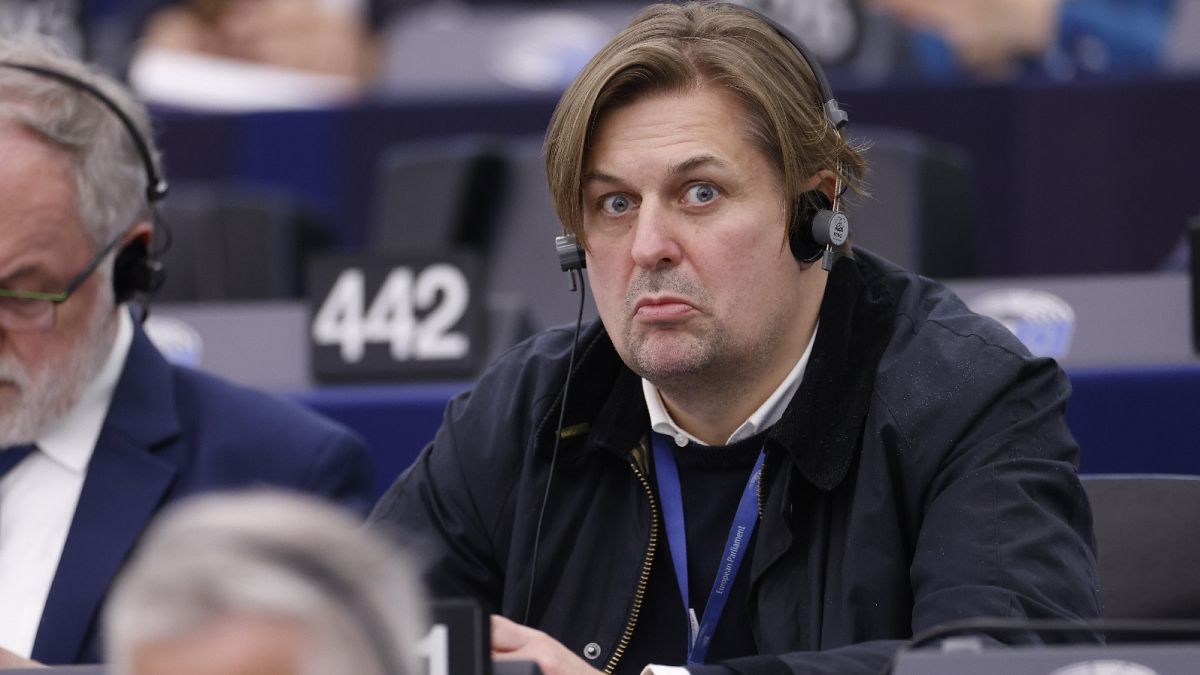The AfD has been marred by multiple scandals over the past few months which has hurt its standing in the polls.
Maximilian Krah, the lead candidate for the European elections for the far-right Alternative for Germany (AfD), has resigned from the party’s federal executive board following pressure from France’s Rassemblement National (RN), Italy’s Lega and the Danish People’s Party (DF).
“I recognise that factual and nuanced statements from me are being misused as a pretext to damage our party,” Krah wrote in a statement posted on X.
“The last thing we need at the moment is a debate about me. The AfD must maintain its unity. For this reason, I will refrain from further campaign appearances with immediate effect and resign as a member of the Federal Executive Committee,” he added.
His resignation from the AfD’s federal board comes after he told Italian media over the weekend that people who wore the SS Nazi paramilitary group uniform during World War II were not “automatically a criminal”.
“You have to assess guilt on a case-by-case basis. At the end of the war, there were almost a million SS. Even (Nobel Prize laureate) Günter Grass was a member of the Waffen-SS,” he said.
As electoral lists can no longer be amended in Germany, Krah is still in the running for re-election as an AfD member of the European parliament.
‘Get rid of Krah’
Krah’s announcement comes after several of AfD’s allies in the European Parliament’s far-right Identity and Democracy (ID) group on Tuesday announced they would end their alliance with the German party over the comments.
Anders Vistisen, the lead candidate for Denmark’s far-right DF who is also representing the group in pre-election debates, wrote on X on Tuesday evening that “Maximilian Krah from the AfD has shown with his statements and actions that he does not belong in the ID group”.
“If the AfD does not take advantage of the situation and get rid of Krah, the DF’s position is that the AfD must leave the ID group,” he added.
In France, Jordan Bardella, the RN’s lead candidate, confirmed his party would no longer sit with the AfD after the June 6-9 elections during a televised debate on Tuesday evening.
“I think that the AfD, with whom we’ve had the opportunity to work in the European Parliament over the last five years, has crossed some lines that I consider to be red lines and, as a result, the Rassemblement National will have new allies at the end of the European elections but will no longer sit alongside the AfD,” he said on LCI.
A source at Italy’s Lega party meanwhile said in a statement on Tuesday evening that “as always, Matteo Salvini and (the RN’s) Marine Le Pen are perfectly aligned and in agreement,” suggesting Lega would back the RN and DF in booting AfD from the group.
A series of scandals
The weekend’s comments are not the only scandal marring the AfD and Krah’s campaign for the European elections.
Krah’s assistant, Jian Guo, was arrested last month in Germany after being accused of serving as “an employee of the Chinese secret service” as well as “repeatedly passing on information about negotiations and decisions in the European Parliament to his intelligence client”.
Guo is also accused of having snooped on Chinese dissidents living in Germany.
Krah and Guo’s offices were raided by police earlier this month but the MEP refused to step down from the AfD’s leadership over the scandal, dubbed Chinagate.
Petr Bystron, the second name on the AfD’s list, was accused last month of accepting over €20,000 in cash from a Moscow-backed influence operation to “promote” its propaganda in the bloc.
The party meanwhile sparked mass protests across Germany in January after investigative website Correctiv revealed that several top AfD officials had held a secret meeting to discuss ‘remigration’, or the forced deportation of all foreigners and minority-ethnic German citizens.
The scandals have hurt AfD in the polls. Although it remains in second position behind the Christian Democratic Union (CDU), its share of the vote has been falling, while that of Chancellor Olaf Scholz’s party, the SPD, has been narrowing the gap.
‘No more political divide’ between ID and ECR
The ID group is expected to be one of the main winners of the upcoming European elections and is projected, with AfD in its fold, to increase its number of seats from 59 to 82, according to Euronews’ Poll Centre. AfD’s removal from the group would diminish that tally.
The hard-right Eurosceptic European Conservatives and Reformists (ECR) group, which counts former ID parties among its members, is also projected to grow from 68 seats to 75 seats, while the number of non-aligned hard-right MEPs should increase by 7 to 55.
The influence these formations have managed to wield has traditionally been weak due to the so-called cordon sanitaire the more pro-EU groups have upheld but also because of infighting among member parties over key issues including migration.
But Vistisen suggested in an interview with Euronews earlier this week that ECR and ID could seek to smooth over their differences to boost their influence.
“What is, in my opinion, wrong is that you have two groups to the right, and I think that has more to do with big personalities in some of the bigger parties than it has to do with political differences,” he told the Global Conversation programme.
“There is no more political divide between the ID and the ECR, than what you can see within the EPP, the S&D or the Renew parties, for instance,” he added.

